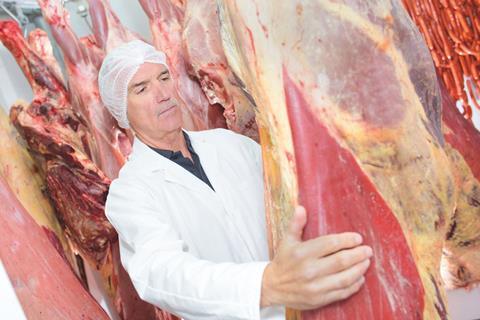The Association of Independent Meat Suppliers (AIMS) has expressed its opposition to the recent statements by Professor Susan Jebb, chair of the Food Standards Agency (FSA), regarding the UK’s meat inspection charging regime.

At its final Board meeting of 2024 the FSA discussed how the costs of FSA meat inspections should be met in the future.
Chair Susan Jebb said: “The FSA has meat inspectors and vets based in abattoirs and meat plants, where they inspect more than a billion animals every year. Under Government rules, the costs of regulatory services should be recovered in full from the industry. However, the current discount scheme has been in place since 2016 and the Board noted the discount was in effect a subsidy to the meat industry and needed to be justified.”
AIMS has expressed its opposition to Jebb’s statement.
Dr Jason Aldiss, head of External Affairs at AIMS said: “Professor Jebb labelled the existing discount system for meat inspection charges as a ‘subsidy’ to the meat industry, a characterisation that AIMS finds both inaccurate and detrimental.
“It is our view that Professor Jebb’s portrayal of the discount system as a subsidy demonstrates a profound misunderstanding of the regulatory framework,” he continued. “The current discounts are essential adjustments designed to counterbalance an excessively bureaucratic and duplicative charging regime that imposes exorbitant costs on the meat industry.
“The current FSA charges to the UK meat sector are among the highest in the world and, in effect are a state sponsored trade barrier placing domestic producers at a significant disadvantage in international markets.”
Headage system proposal
In light of these challenges, AIMS advocates for the adoption of a headage-based charging system. It claims this approach would align with international standards, ensuring a fairer and more transparent method of cost assessment that reflects the actual scale of operations, thereby promoting competitiveness and sustainability within the industry.
“Professor Jebb’s assertion that meat inspection is a ‘vital consumer protective function’ is increasingly contested by international experts,” continued Aldiss. “The European Food Safety Authority (EFSA) has questioned the effectiveness of traditional meat inspection methods, suggesting that certain practices may not effectively detect modern biological hazards and could, in some cases, be detrimental to food safety. This raises critical questions about the allocation of resources and the necessity of current inspection protocol.
“Furthermore, Professor Jebb’s claim that meat inspection charges constitute only a minor cost to slaughter plants reflects a lack of awareness of industry economics.
“While these charges may represent a small fraction of total turnover, they have a substantial impact on net margins, particularly for small and medium-sized enterprises. The financial burden imposed by these fees threatens the viability of numerous businesses, undermining the broader agricultural economy.
“If meat inspections are indeed deemed a vital consumer protection measure, which is contrary to the evidence, it stands to reason that their funding should be sourced from public taxation rather than imposing disproportionate costs on industry operators. This would ensure that public health objectives are met without compromising the economic stability of the meat sector.”
Jebb added: “We want to look at the scheme again to ensure it continues to uphold the safety of our meat and also helps to achieve other outcomes that are important to the public, such as animal welfare or support for rural communities and businesses.
“The early evidence from our recent meat charging call for evidence has provided valuable insights into how businesses and consumers are affected by the discounts we provide. FSA officials were asked to continue engagement with stakeholders and Governments in England, Wales and Northern Ireland so we can develop a full picture ahead of providing advice to Ministers next year.”












